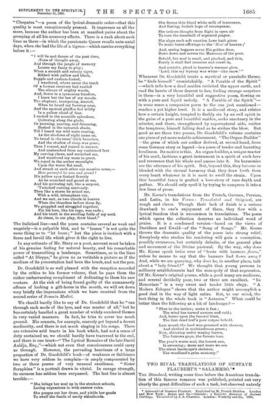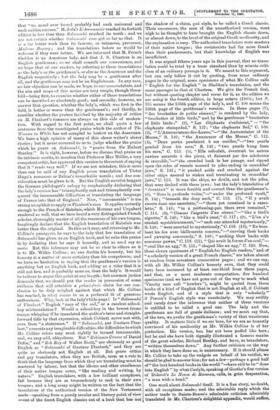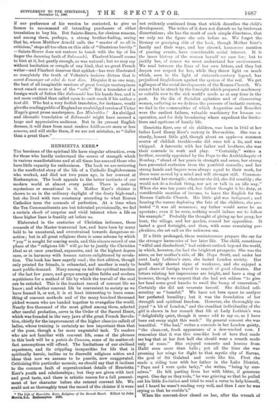TWO RIVAL TRANSLATIONS OF GUSTAVE FLAUBERT'S " SALAMMBo."* THE Standard,
writing some time before the American transla.- tion of this famous romance was published, pointed out very clearly the great difficulties of such a task, but observed untruly
• Salammbd of Gustave Flaubert. Englished by M. French Sheldon. London and New York: Saxon and Co.—Salambo a Realistic Romance of Ancient Carthage. Tr:Insisted by J. S. Chartres. London : Vizetelly and Co. 1886, tongue ; and a long essay might be written on the fact that the One word about So2annab6 itself. It is a fine story, no doubt, translators of the authorised version of the New Testament with all exceptions made ; and the admirable reply which the made—speaking from a purely secular and literary point of view author made to Sainte-Beuve's admirable criticism admirably —one of the finest English classics out of a book that has not translated in Mr. Chartres's delightful appendix, would suffice, that " no novel ever issued probably had such universal and the shadow of a claim, qua style, to be called a Greek classic. such sadden success." M. Zola's L' Aseommoir reached its fortieth Their successors, the men of the unauthorised version, went
edition in less time than Salammbi; reached its tenth ; and we nigh to be thought to have brought the English classic down, are not certain whether Sa1ammb3 ever got so far as that. It or almost down, to the level of the original Greek mediocrity, and
is a far better work than its famous, or infamous, precursor, the explanation is easy. The authorised translators were masters .31culanie Bovary ; and the translations before Os would be of their native tongue; the revisionists had far more Greek welcome if they were better. We are informed that M. French than their predecessors, but their knowledge of English was Sheldon is an American lady, and that J. S. Chartres is an insufficient.
English gentleman ; so we shall consult our convenience, and It was argued fifteen years ago in this journal, that no trans.
we hope that of our readers, by referring to these translations lation could be tried by a truer standard than by minute criti- as the lady's or the gentleman's, or else as the American and the cism of an ordinary passage in it. We assent to this argument, English respectively ; but the lady may be a gentleman after but can only follow it out by quoting, from some ordinary all, and the gentleman may not be an Englishman. In any case, pages in the original, some specimens of what Mr. Collins calls no fair objection can be made, we hope, to our nomenclature, and " English for the English " in Sheldon's translation, and the the aim and scope of this notice are very simple, though three- same passages in that of Chartres. We give the French first, fold—being first, to examine whether either of these translations but without quoting chapter and verse for it, as the edition we can be described as absolutely good ; and secondly, however, we are using is the fourth edition, in large octavo (1863) ; but S.
answer that question, whether the lady's, which was first in the 135 means the 135th page of the lady's, and C. 108 means the field, is better or worse than the gentleman's ; and thirdly, to 108th page of the gentleman's version. In these pages (1), consider whether the praises lavished by the majority of critics " des brochettes de petits oiseaux," is rendered by the lady, on M. Flaubert's romance are always on this side of modera- " brochettes of little birds," and by the gentleman " brochettes tiou. With regard to the first point, we shall quote a few of little birds ;" (2), " Les elephants s'enfairent," — " the sentences from the unmitigated praise which the author of The elephants stampeded," S. 137; " the elephants fled," C. 109.
Woman in. White has not scrupled to bestow on the American. (3), " L'Annunciateur-des-Lunes,"—" the Annunciator of the We have a high opinion of many of this clever writer's clever Moons," S. 140; " the Announcer of the Moons," C. 112.
stories ; but it never occurred to us to judge whether the praise (4), " Deux perles pendaient ses oreilles,"—" two pearls which he pours on Salammb6, is " praise from Sir Hubert pended from his ears," S. 141 ; " two pearls hung from Stanley." It is right, however, before we discuss that praise on his ears," C. 113. (5), " Elle refoulait, eventrait les antres
its intrinsic merits, to mention that Professor Max Muller, a very navires amarres a des pieux, et finissant par des maehoires competent critic, has approved this version to the extent a Baying de crocodile,"—" she crowded back in her pasage, and ripped
that it "reads very well." If we are not mistaken, this is more open the sides of vessels moored to piles ending in crocodiles' than can be said of any English prose translation of Victor jaws," S. 141; "it pushed aside and crushed against the Hugo's romances or Balzac's remarkable novels ; and due con- other ships moored to stakes and terminating in crocodiles' sideration must be given to it. But the English novelist beggars jaws," C. 113. It was the ships, no doubt, and not the piles, the German philologist's eulogy by emphatically declaring that that were decked with these jaws ; but the lady's translation of the lady's version has "triumphantly met and triumphantly con- " eventrait " is more forcible and correct than the gentleman's. quered the innumerable difficulties of translating the language (6), "Sous In profonde voille,"—" under the profound vault," of France into that of England." Now, "innumerable" is too S. 142; "beneath the deep arch," C. 113. (7), "II y avait
strong an epithet to apply in Flanbert's case. It applies correctly encore dans tine cassolette,"—" there yet remained in a casso- enough to the French of Rabelais, which Mottenx and Urquhart lette," S. 143; "in a perfuming-pan there even remained," rendered so well, that we have heard a very distinguished French C. 114. (8), " Comme l'aigrette d'un oiseau,"—" like a bird's scholar, thoroughly master of all the resources of his own tongue, aigrette," S. 146; "like a bird's crest," C. 117; (9), " L'on s'y laughingly declare that the English translation of Rabelais was rendait mystoriensement,"—" each one attended mysteriously," better than the original. Be this as it may, and returning to Mr. S. 148; "were resorted to mysteriously," C. 118. (10), "En born. Collins's panegyric, he says to the lady that her translation of bant lea dos avec bitillements sonorea,"—" curving their backs Salamndx; has given us an English book, and he rubs this praise and yawning sonorously," S. 149; "arching their backs with in by declaring that he says it honestly, and BO need say no sonorous yawns," C. 119. (11), " Qui avait la forme d'un ceuf,"— more. But this inference may not be so clear to others as it "oval like an egg," S. 151; "shaped like an egg," 0.120. Now, is to Mr. Wilkie Collins ; no one doubts his honesty, but his these eleven specimens of " English for English readers," and of honesty is a matter of more certainty than his competence; and "a scholarly version of a great French classic," are taken almost we have no hesitation in saying that the gentleman's version is at random from seventeen consecutive pages ; and we can say, anything but an English book, and adding as a rider that it is with all Mr. Wilkie Collins's honesty even, that they could still not less, and is probably more so, than the lady's. It would have been increased by at least one-third from these pages, be tedious to argue this point at any length ; but common justice and that, on a most moderate computation, five hundred demands that we should put the reader in possession of some specimens (and we have not gone out of the way to mark what evidence that will establish a primaVacie claim for our con- 'Varsity men call "howlers "), might be quoted from these elusion to be duly weighed against that which Mr. Collins books of a kind of English that is not English at all, if Cobbett has reached, in what seems to us a perfervid fit of generous wrote English, and of a style that is only "scholarly" enthusiasm. Why, look at the lady's title-page! Is " Salammb6 if Porson's English style was unscholarly. We may swiftly of Flaubert" English "racy of the soil," or a careless school- and surely draw the inference that neither of these versions boy mistranslation ? Would a school-boy in the lowest forms is entitled to be called a good one. The lady and the escape whipping if he translated the author's terse and straight- gentleman are fall of gentle dullness ; and we must say that, forward title by that expression, which Cobbett never met with, of the two, we prefer the gentleman's variety of that wearisome even from "a statesman." If " Salammbei, par Gustave Flan- quality. It matters little if we err here, for we are as honestly bert," presents any imaginable difficulties, the difficulties to which convinced of his mediocrity as Mr. Wilkie Collins is of her Mr. Collins refers may most rightly be termed innumerable, perfection. His version, too, has not been puffed like hers ; and, we may add, ubiquitous. But "Robinson Crusoe of Daniel but he and she have both signally illustrated a famous maxim Defoe," and "Rob Boy of Walter Scott," are obviously as good of the great scholar, Richard Bentley, and have, as translators, English as " Salammbo of Gustave Flaubert," and they are "written themselves down." Any further criticism on the way quite as obviously not English at all. But grave critics in which they have done so, is unnecessary. If it should please and gay translators, when they are British, seem as a rule to Mr. Collins to take up the cudgels on behalf of his verdict, we think that the language from which they are translating must be should be glad to answer him; for not a few—perhaps a good half mastered by labour, but that the idioms and other excellences of" the best hundred books in the world "—have still to be " done of their native tongue come, "like reading and writing, by into English" by what Carlyle, speaking of Goethe's fine version nature." English translators, with a few brilliant exceptions, of Diderot's Le Neveu de Rameau, calls, in grim desperation, fail because they are so tremendously to seek in their own "a man with a head."
if our preference of his version be contested, to give us license to recommend all intending purchasers of either translation to buy his. But Sainte-Beuve, for obvious reasons, and among them, perhaps, a strong brother-feeling, seeing that he, whom Matthew Arnold calls the "master of us all in criticism," stops all too often on this side of "illustrious brevity" —Sainte-Beuve does not venture to touch with the tip of his finger the damning fault of Salannubi. Flaubert himself seems to hint at it, but gently enough, as was natural ; but we may say without hesitation or scruple of any kind, that no great French writer—and Flaubert deserves that epithet—has ever illustrated so completely the truth of Voltaire's incisive dictum that le secret d'ennuyer est celui de tout dire. Disguise it as one may, the best of all imaginable versions of great foreign masterpieces must smack more or less of the "crib." But a translator of a foreign work of fiction like Salammbi has his bands free, and is not more entitled than called upon to omit much if his author a tout dit. Who but a very foolish translator, for instance, would give the reading public of England an unabridged version of Victor Hugo's great prose masterpiece, Les lifisclrables ? An abridged and idomatic translation of Salammba might have secured a large and appreciative audience. But in its present English dresses, it will draw from most readers baillements more or less sonores, and will strike them, if we are not mistaken, as "duller than a great thaw."


















































 Previous page
Previous page